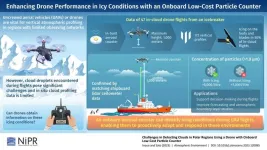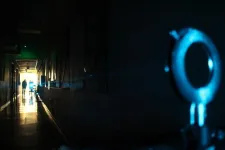(Press-News.org) Now that improvements in technology mean that some robots work alongside humans, there is evidence that those humans have learned to see them as team-mates — and teamwork can have negative as well as positive effects on people’s performance. People sometimes relax, letting their colleagues do the work instead. This is called ‘social loafing’, and it’s common where people know their contribution won’t be noticed or they’ve acclimatized to another team member’s high performance. Scientists at the Technical University of Berlin investigated whether humans social loaf when they work with robots.
“Teamwork is a mixed blessing,” said Dietlind Helene Cymek, first author of the study in Frontiers in Robotics and AI. “Working together can motivate people to perform well but it can also lead to a loss of motivation because the individual contribution is not as visible. We were interested in whether we could also find such motivational effects when the team partner is a robot.”
A helping hand
The scientists tested their hypothesis using a simulated industrial defect-inspection task: looking at circuit boards for errors. The scientists provided images of circuit boards to 42 participants. The circuit boards were blurred, and the sharpened images could only be viewed by holding a mouse tool over them. This allowed the scientists to track participants’ inspection of the board.
Half of the participants were told that they were working on circuit boards that had been inspected by a robot called Panda. Although these participants did not work directly with Panda, they had seen the robot and could hear it while they worked. After examining the boards for errors and marking them, all participants were asked to rate their own effort, how responsible for the task they felt, and how they performed.
Looking but not seeing
At first sight, it looked as if the presence of Panda had made no difference — there was no statistically significant difference between the groups in terms of time spent inspecting the circuit boards and the area searched. Participants in both groups rated their feelings of responsibility for the task, effort expended, and performance similarly.
But when the scientists looked more closely at participants’ error rates, they realized that the participants working with Panda were catching fewer defects later in the task, when they’d already seen that Panda had successfully flagged many errors. This could reflect a ‘looking but not seeing’ effect, where people get used to relying on something and engage with it less mentally. Although the participants thought they were paying an equivalent amount of attention, subconsciously they assumed that Panda hadn’t missed any defects.
“It is easy to track where a person is looking, but much harder to tell whether that visual information is being sufficiently processed at a mental level,” said Dr Linda Onnasch, senior author of the study.
Safety at risk?
The authors warned that this could have safety implications. “In our experiment, the subjects worked on the task for about 90 minutes, and we already found that fewer quality errors were detected when they worked in a team,” said Onnasch. “In longer shifts, when tasks are routine and the working environment offers little performance monitoring and feedback, the loss of motivation tends to be much greater. In manufacturing in general, but especially in safety-related areas where double checking is common, this can have a negative impact on work outcomes.”
The scientists pointed out that their test has some limitations. While participants were told they were in a team with the robot and shown its work, they did not work directly with Panda. Additionally, social loafing is hard to simulate in the laboratory because participants know they are being watched.
“The main limitation is the laboratory setting,” Cymek explained. “To find out how big the problem of loss of motivation is in human-robot interaction, we need to go into the field and test our assumptions in real work environments, with skilled workers who routinely do their work in teams with robots.”
END
Do humans get lazier when robots help with tasks?
Scientists find that humans pay less attention to their work when they think robots have already checked it
2023-10-18
ELSE PRESS RELEASES FROM THIS DATE:
Using AI to develop hydrogen fuel cell catalysts more efficiently and economically
2023-10-18
Proton exchange membrane hydrogen fuel cells (PEMFCs) used in hydrogen vehicles use expensive platinum catalysts to facilitate the oxygen reduction reaction at the anode. There are a vast number of elemental combinations and compositions that need to be explored to develop more efficient and cost-effective catalyst materials than platinum, and researchers are still doing a lot of trial and error in the lab.
The Korea Institute of Science and Technology (KIST, President Seok Jin Yoon) announced that Dr. Donghun ...
Enhancing the safety and efficacy of drone flights in polar regions
2023-10-18
Collecting accurate weather data in remote and challenging environments like the polar regions and mountains can be extremely difficult. These areas often lack the infrastructure and resources needed for traditional weather stations, and the harsh weather conditions can make it dangerous for humans to access and maintain these stations.
Drones can navigate these challenging terrains, gather data, and transmit it to researchers, making them an indispensable tool for addressing these data gaps. Unfortunately, in-cloud flights still pose a challenge, with icing from supercooled cloud droplets that can damage vital drone components, ...
Is it ok to press the snooze button?
2023-10-18
Snoozing, or using intermittent alarms to get in a few more minutes of sleep in the morning, may have benefits for some people, according to research published in the Journal of Sleep Research.
In a study of 1,732 adults who described their waking habits, 69% of participants reported using the snooze function or setting multiple alarms at least “sometimes.” In those who snoozed, the average time spent snoozing per morning was 22 minutes, ranging from 1 to 180 minutes. Snoozers tended to be younger than non-snoozers and were more likely to be evening types. Morning drowsiness and shorter sleep were also more common in those who snoozed.
In a second ...
Prenatal exposure to environmental chemicals linked to childhood growth changes
2023-10-18
A new study led by researchers from the Barcelona Institute for Global Health (ISGlobal), a centre supported by the ”la Caixa Foundation” has shed light on the influence that Endocrine-Disrupting Chemicals (EDCs) can have on children's growth during their early years. The results, published in Environmental Health Perspectives, show that prenatal exposure to some of these environmental chemicals and their mixtures is linked to accelerated Body Mass Index (BMI) gain from birth to nine years ...
Nearly half of oncology drugs approved since 1998 are precision therapies
2023-10-18
Bottom Line: Of the 198 new oncology drugs approved by the U.S. Food and Drug Administration (FDA) between 1998 and 2022, approximately 43% were precision oncology therapies, the use of which is guided by biomarker testing.
Journal in Which the Study was Published: Cancer Discovery, a journal of the American Association for Cancer Research (AACR).
Authors: Debyani Chakravarty, PhD, assistant attending molecular geneticist in the Department of Pathology and Laboratory Medicine and lead scientist of the precision oncology knowledge base OncoKB at Memorial Sloan Kettering Cancer Center (MSK), was the senior author of the study. Sarah P. ...
Ocean Sciences Meeting 2024 press registration now open
2023-10-18
WASHINGTON — Press registration is now open for the 2024 Ocean Sciences Meeting, co-sponsored by the American Geophysical Union (AGU), the Association for the Sciences of Limnology and Oceanography (ASLO), and The Oceanography Society (TOS), in New Orleans, Louisiana 18 to 23 February 2024. The biennial Ocean Sciences Meeting brings together 5,000 scientists, students, policymakers and educators to discuss breaking research across the ocean sciences and critical issues affecting a sustainable future for our oceans.
PRESS: REGISTER and BOOK HOTELS
Staff, freelance and student journalists are eligible to apply for complimentary press registration through the end of the conference. ...
Founder personality could predict start-up success: study
2023-10-18
The stats don’t lie – the overwhelming majority of start-up companies fail. So, what makes the seemingly lucky few not only survive, but thrive?
While good fortune and circumstances can play a part, new research reveals that when it comes to start-up success, a founder’s personality – or the combined personalities of the founding team - is paramount. The study, published today in Scientific Reports, shows founders of successful start-ups have personality traits that differ significantly from the rest of the population – and that these traits are more important for success than many other ...
Advances in gynaecological cancer research could change the treatment landscape
2023-10-18
Lugano, Switzerland, 17 October 2023 – Results from highly anticipated phase 3 clinical trials in gynaecological cancers with, among others, new data that cover the entire spectrum of managing patients with cervical cancer, will be presented at the ESMO Congress 2023 in Madrid, Spain. The late-breaking studies will be featured in Presidential and Proffered Paper Sessions, and could change the treatment landscape for women with these cancers. The new therapies tested delayed the time to relapse and, in some cases, lengthened survival.
“These ...
Physicists create new form of antenna for radio waves
2023-10-18
University of Otago physicists have used a small glass bulb containing an atomic vapor to demonstrate a new form of antenna for radio waves. The bulb was “wired up” with laser beams and could therefore be placed far from any receiver electronics.
Dr Susi Otto, from the Dodd-Walls Centre for Photonic and Quantum Technologies, led the field testing of the portable atomic radio frequency sensor.
Such sensors, that are enabled by atoms in a so-called Rydberg state, can provide superior performance over current antenna ...
UCLA-led team finds a stem-cell derived mechanism that could lead to regenerative therapies for heart damage
2023-10-18
UCLA-led team finds a stem-cell derived mechanism that could lead to regenerative therapies for heart damage
A UCLA-led team has identified an essential internal control mechanism that can promote the maturation of human stem cell-derived heart muscle cells, offering a deeper understanding of how heart muscle cells develop from their immature fetal stage to their mature adult form.
The findings, published in the peer-reviewed journal Circulation, could lead to new therapies for heart disease and cardiac damage.
The collaborative effort with Duke-NUS Medical School in Singapore and other institutions identified an RNA splicing ...
LAST 30 PRESS RELEASES:
GLP-1 drugs associated with reduced need for emergency care for migraine
New knowledge on heritability paves the way for better treatment of people with chronic inflammatory bowel disease
Under the Lens: Microbiologists Nicola Holden and Gil Domingue weigh in on the raw milk debate
Science reveals why you can’t resist a snack – even when you’re full
Kidney cancer study finds belzutifan plus pembrolizumab post-surgery helps patients at high risk for relapse stay cancer-free longer
Alkali cation effects in electrochemical carbon dioxide reduction
Test platforms for charging wireless cars now fit on a bench
$3 million NIH grant funds national study of Medicare Advantage’s benefit expansion into social supports
Amplified Sciences achieves CAP accreditation for cutting-edge diagnostic lab
Fred Hutch announces 12 recipients of the annual Harold M. Weintraub Graduate Student Award
Native forest litter helps rebuild soil life in post-mining landscapes
Mountain soils in arid regions may emit more greenhouse gas as climate shifts, new study finds
Pairing biochar with other soil amendments could unlock stronger gains in soil health
Why do we get a skip in our step when we’re happy? Thank dopamine
UC Irvine scientists uncover cellular mechanism behind muscle repair
Platform to map living brain noninvasively takes next big step
Stress-testing the Cascadia Subduction Zone reveals variability that could impact how earthquakes spread
We may be underestimating the true carbon cost of northern wildfires
Blood test predicts which bladder cancer patients may safely skip surgery
Kennesaw State's Vijay Anand honored as National Academy of Inventors Senior Member
Recovery from whaling reveals the role of age in Humpback reproduction
Can the canny tick help prevent disease like MS and cancer?
Newcomer children show lower rates of emergency department use for non‑urgent conditions, study finds
Cognitive and neuropsychiatric function in former American football players
From trash to climate tech: rubber gloves find new life as carbon capturers materials
A step towards needed treatments for hantaviruses in new molecular map
Boys are more motivated, while girls are more compassionate?
Study identifies opposing roles for IL6 and IL6R in long-term mortality
AI accurately spots medical disorder from privacy-conscious hand images
Transient Pauli blocking for broadband ultrafast optical switching
[Press-News.org] Do humans get lazier when robots help with tasks?Scientists find that humans pay less attention to their work when they think robots have already checked it


